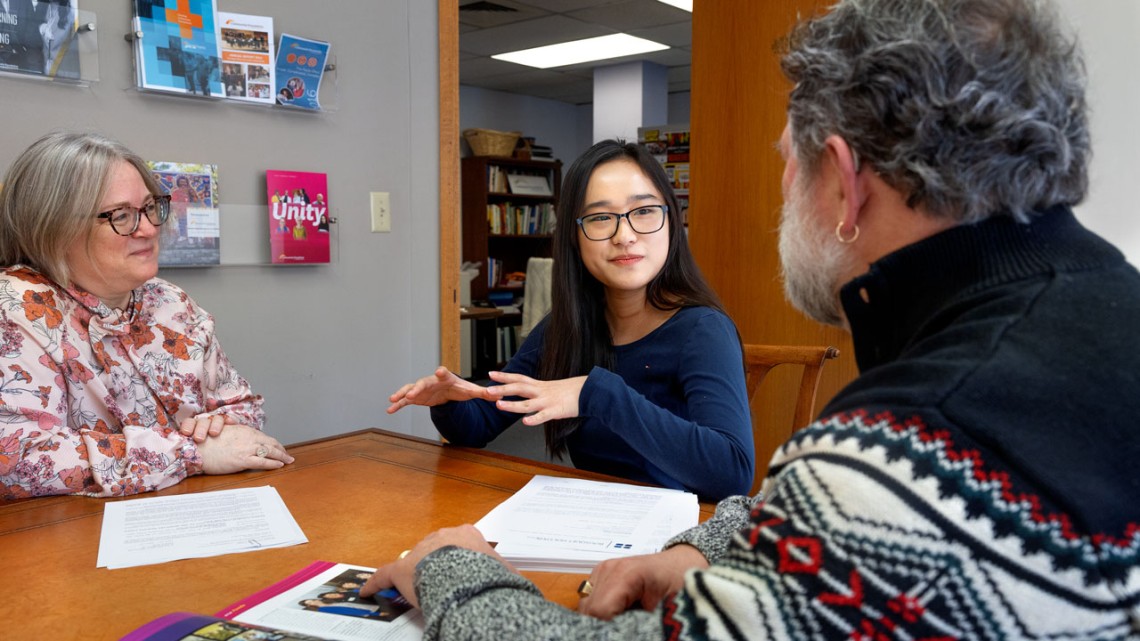
Ying Lin Zhao ’26, center, works with Amy LeViere ’95, left, chief philanthropic services and systems officer, and CEO George Ferrari ’84 at the Tompkins County Community Foundation.
Community Work-Study Program celebrates 50 years
By Olivia Hall
When Ying Lin Zhao ’26 first started working at the Community Foundation of Tompkins County, a nonprofit that aims to improve the quality of life in the county through collaborations, philanthropy and inclusion, she didn’t know what to expect.
“Before this job, I didn’t have a clue what to do as my career, but now I’ve learned a lot of problem-solving skills and have found my passion for data analytics,” said Zhao, a double major in statistical science and information science in the College of Arts and Sciences, who helped the organization build a dashboard to showcase its work, analyzed donation data and managed a database.
Zhao was hired through the Community Work-Study Program (CWSP), which enables Cornell undergraduates with federal work-study (FWS) as part of their financial aid package to work for local nonprofits, schools and municipalities and is administered by Cornell’s Einhorn Center for Community Engagement. Celebrating its 50th anniversary at the university this year, the program facilitates placements with about 50 community partners for some 250 students during the academic year, and for 70 during the summers. The community organizations receive subsidies of 75% to 100% of the students’ wages for jobs that improve the quality of life for community residents, especially low-income individuals.
“It’s a unique program where we utilize the federal funding to be able to create positions that otherwise may not exist,” said Nicole MacPherson, Cornell’s CWSP coordinator. “It’s a huge benefit to both the community and students.”
The Community Foundation usually employs one to five students at a time – support that wouldn’t otherwise be possible.
“We knew we weren’t going to hire additional staff but that we could provide a really good educational setting for those interested in learning about philanthropy and the community,” said CEO George Ferrari ’84. “The students have been universally curious, competent, experienced, very professional, reliable and really nice. It has worked out really, really well for us.”
Since its launch in 2021, the Susan Christopherson Center for Community Planning – part of the Center of Transformative Action – has hired four to six students as program assistants every year, about half of whom are subsidized through CWSP.
“The CWSP program has been critical to the growth of the Christopherson Center, a young, ambitious – and lean – organization,” said Gretchen Worth, M.A. ’18, its project director. “The interest and enthusiasm our CWSP program assistants bring to their work is as impressive as their skills, whether in GIS, data analysis, writing and editing, IT management and so many more. They have contributed important research to existing efforts.”
Based on their interests and skills, students are matched to projects such as reducing building waste, building flood resilience or helping to highlight equity in professional planners’ work. The center often hires the students as first-years, allowing them to stay on with their employer for several semesters, building continuity and providing students with an opportunity to see their work come to fruition.
“I was engaging with topics that could not have felt more relevant to my major in urban and regional studies,” said Emile Bensedrine ’23, who helped the Christopherson Center build partnerships with other organizations, conducted data analysis, helped set up a youth focus group, produced maps and graphics, and interviewed planners and officials.
“The work was very self-guided, and I had to learn a lot of self-motivation, staying accountable, clearly recording my methods and communicating work with colleagues and my supervisor, Bensedrine said.
When he applied for post-graduation jobs, Bensedrine’s work at the organization was, “unsurprisingly, a huge resume boost,” he said. “My interviewers were impressed with its work and impact.” He now works for infrastructure consulting firm AECOM as an urban planner with a focus on community engagement.
An additional benefit of many jobs facilitated by CWSP is helping students become part of the broader community, MacPherson said.
“It’s a chance for the students to switch gears from a Cornell focus to a community focus,” said Rob Covert ’89, chief of the Ithaca Fire Department, who has hired several undergraduates as records clerks through CWSP to help make his organization “as paperless as practical.” During one summer of full-time work, Covert estimates, they processed around 35 legal-size boxes of documents, checking that digital scans are complete and properly tagged.
“We have a massive backlog that takes up an incredible amount of space, and we lacked the bandwidth to deal with it without assistance,” he said. The work has led to increased operational efficiency, faster response times to public requests for information and more physical space for other purposes.
Covert also strives to draw students further into the community. “They’re always invited to share a meal with the on-duty firefighters,” he said. Local residents, in turn, get the opportunity to meet students as individuals. “Anytime that Cornell students and members of the community have a chance to interact, it helps with town-gown relations. I think this has been a really good partnership.”
To get involved as a student employee or community employer, visit the Einhorn Center’s CWSP webpage.
Olivia Hall is a freelance writer for the Einhorn Center for Community Engagement.
Media Contact
Get Cornell news delivered right to your inbox.
Subscribe

